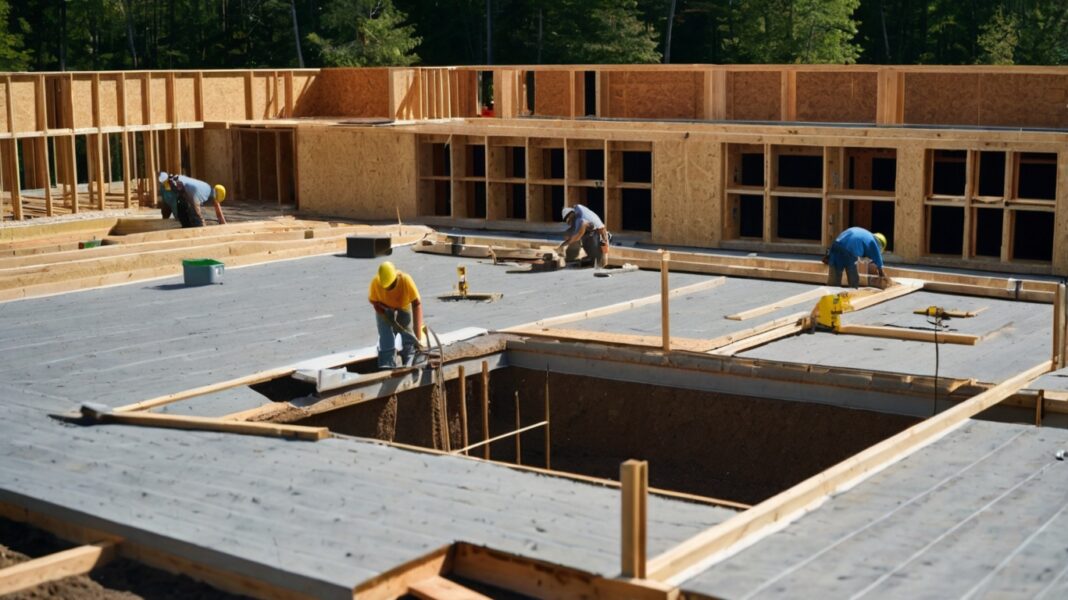Foundations of Strength:Building a home is one of the most significant investments you can make, and ensuring its durability is paramount. A strong, durable home provides safety, comfort, and long-term value. This blog explores the key considerations for constructing a durable home, focusing on the foundation, materials, design, and maintenance.
1. Solid Foundations
The foundation is the bedrock of any structure, and its quality directly impacts the durability of the home. There are several types of foundations, including slab, crawl space, and basement. Each has its advantages, but the choice depends on the soil conditions, climate, and budget.
- Soil Testing: Before laying the foundation, conduct a soil test to understand its composition and load-bearing capacity. This step is crucial as different soil types have varying stability levels.
- Proper Footings: Footings distribute the weight of the home to the soil. Ensure they are wide and deep enough to prevent settling and shifting.
- Waterproofing: Moisture is a major enemy of foundations. Proper drainage systems, waterproof coatings, and membranes are essential to keep water away from the foundation and prevent cracks and erosion.
2. Quality Materials
Using high-quality materials is non-negotiable when aiming for a durable home. The materials you choose for the foundation, frame, roofing, and finishes will determine the home’s longevity and resilience.
- Concrete and Steel: For the foundation and structural frame, opt for high-strength concrete and steel. These materials offer excellent load-bearing capacity and resistance to environmental factors.
- Wood Quality: If using wood for framing, select high-grade, treated lumber to protect against pests and rot. Engineered wood products can also provide additional strength and stability.
- Roofing Materials: The roof serves as your home’s primary shield against the elements. Opting for durable materials such as metal, slate, or premium-grade shingles will ensure that your roof stands strong against severe weather conditions. In West Valley City, choosing a reliable roofing installation service can further enhance your roof’s resilience and longevity.
3. Smart Design
A well-thought-out design enhances the durability of a home. Consider both the architectural style and the practical aspects of the design.
- Wind Resistance: In areas prone to high winds or hurricanes, incorporate design elements like reinforced windows, storm shutters, and wind-resistant roof structures.
- Earthquake Safety: In seismic zones, use flexible materials and design techniques that allow the building to absorb and dissipate seismic energy. Reinforced concrete, steel frames, and base isolators can significantly reduce earthquake damage.
- Energy Efficiency: Durable homes are often energy-efficient. Incorporate insulation, energy-efficient windows, and smart HVAC systems to reduce energy consumption and enhance the home’s overall resilience.
4. Construction Techniques
Employing the right construction techniques ensures the home is built to last. Skilled labor and attention to detail during construction are critical.
- Proper Framing: Ensure the framing is square, level, and plumb. Accurate framing provides the skeleton for a durable home, preventing issues like warped walls and uneven floors.
- Moisture Barriers: Install moisture barriers behind siding, under flooring, and around windows and doors. These barriers protect the structure from water infiltration, which can cause mold, rot, and structural damage.
- Ventilation: Adequate ventilation in attics and crawl spaces prevents moisture buildup, which can lead to mold and structural decay. Ridge vents, soffit vents, and exhaust fans are essential components.
5. Regular Maintenance
Even the most well-built home requires regular maintenance to ensure its longevity. Create a maintenance schedule and address issues promptly to avoid costly repairs down the line.
- Roof Inspections: Check the roof regularly for signs of damage, such as missing shingles or leaks. Prompt repairs can prevent water damage to the structure.
- Foundation Checks: Inspect the foundation for cracks, settling, or water infiltration. Early detection of foundation issues can save significant repair costs.
- Gutter Cleaning: Clean gutters and downspouts regularly to prevent water buildup around the foundation, which can cause erosion and structural damage.
- Pest Control: Regular pest inspections and treatments protect the home from termites, rodents, and other pests that can cause structural damage.
Conclusion
Building a durable home involves careful planning, quality materials, smart design, skilled construction, and ongoing maintenance. By focusing on these key considerations, you can ensure your home stands the test of time, providing a safe and comfortable living environment for generations to come. Investing in a strong foundation and taking proactive measures during construction and maintenance will pay off in the form of a resilient, long-lasting home.




